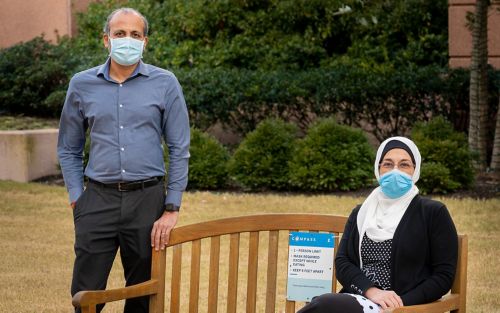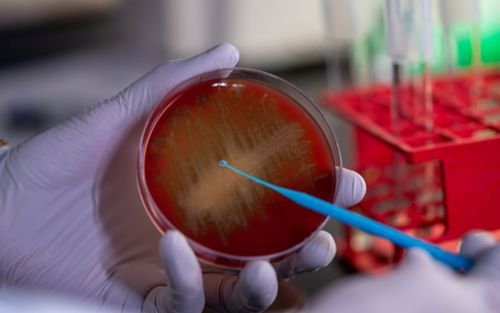St. Jude Family of Websites
Explore our cutting edge research, world-class patient care, career opportunities and more.
St. Jude Children's Research Hospital Home

- Fundraising
St. Jude Family of Websites
Explore our cutting edge research, world-class patient care, career opportunities and more.
St. Jude Children's Research Hospital Home

- Fundraising
About the Department
The goal of the Department of Infectious Diseases at St. Jude Children’s Research Hospital is to study devastating diseases of childhood through a comprehensive approach including basic science research, translational trials, and bedside care.
Among the top infectious causes of death worldwide are respiratory diseases and HIV/AIDS. The Department of Infectious Diseases seeks to focus on the pathogenesis of these infections with a breadth of commitment that extends from the research bench to the bedside. Investigations take place at progressive levels: manipulation of genes is expected to lead to phenotypes in cell culture systems that can be modeled in animal studies. Therapeutic candidates in the form of antimicrobials, vaccines, or adjunctive therapies are further pursued in clinical trials in children.
Infectious Diseases Leadership
-
View Details
Octavio Ramilo, MD
Member, St. Jude Faculty
Chair, Department of Infectious Diseases
Octavio Ramilo, MD
Member, St. Jude Faculty
Chair, Department of Infectious Diseases
Affiliations
Research Interests
- Viral respiratory infections
- Early life immunity
- Application of systems analysis tools in the clinical setting
Contact Information
Octavio Ramilo, MD
Infectious Diseases
MS 320, Room E8050
St. Jude Children's Research Hospital
262 Danny Thomas Place
Memphis, TN 38105-3678
-
View Details
Aditya Gaur, MD
Member, St. Jude Faculty
Medical Director, Occupational Health
Director, Translational Trials Unit
Director, Clinical Research, Infectious Diseases
Aditya Gaur, MD
Member, St. Jude Faculty
Medical Director, Occupational Health
Director, Translational Trials Unit
Director, Clinical Research, Infectious Diseases
Clinical Interests
- Diagnosis and treatment of infections in immunocompromised children
- Pediatric HIV infection
- Epidemiology of infectious diseases
Contact Information
Aditya Gaur, MD
Infectious Diseases
MS 600, Room Q1078
St. Jude Children's Research Hospital
262 Danny Thomas Place
Memphis, TN 38105-3678
-
View Details
Gabriela Maria Marón, MD, MSc
Associate Member, St. Jude Faculty
Affiliations
Research Interests
- Infectious complications in immunocompromised hosts, particularly fungal infections
- Dengue virus infections
- Pediatric and adolescent HIV/AIDS
Contact Information
Gabriela Maria Marón, MD, MSc
Infectious Diseases
MS 600, Room Q1077C
St. Jude Children's Research Hospital
262 Danny Thomas Place
Memphis, TN 38105-3678
-
View Details
Steven M. Varga, PhD
Member, St. Jude Faculty
Dean, Graduate School of Biomedical Sciences
Ex-officio member, Board of Trustees
Steven M. Varga, PhD
Member, St. Jude Faculty
Dean, Graduate School of Biomedical Sciences
Ex-officio member, Board of Trustees
Research Interests
- Immunopathogenesis of respiratory viruses
- Innate and adaptive immunity to respiratory syncytial virus
- Vaccine development
- Pathogenesis of viral co-infections
- Cancer immunotherapy
Short Biography
Steven Varga received his undergraduate degree from the University of Notre Dame before going on to earn his PhD in Immunology and Virology from the UMass Chan Medical School. He completed a post-doctoral fellowship at the University of Virginia, after which he joined the faculty of the University of Iowa.
In Iowa, his passion for mentorship and working with students took hold through his role as Associate Dean of Academic Affairs and Graduate Student Development in the Graduate College. He held the position of Professor of Microbiology and Immunology and maintained a secondary appointment in Pathology. In this role, he led an independent research program focusing on the role of virus-specific T lymphocytes in mediating immunity and immunopathology during viral infections, with a particular focus on respiratory viruses such as RSV, influenza A virus and SARS-CoV-2.
In 2021, he was recognized with a certificate of distinction for the Annual Student Supervisor of the Year Award from the University of Iowa. He has been the recipient of grants and fellowship support from the American Association of Immunologists, the American Lung Association and the National Institutes of Health, among others. He is an active member of the American Association of Immunologists, the American Society for Microbiology and the Society for Leukocyte Biology. He serves on several journal editorial boards and often gives invited lectures on his research.
Contact Information
Steven M. Varga, PhD
Graduate School of Biomedical Sciences
MS 1500, Room IA1200
St. Jude Children's Research Hospital
262 Danny Thomas Place
Memphis, TN 38105-3678
-
View Details
Joshua Wolf, PhD, MBBS
Associate Member, St. Jude Faculty
Affiliations
Research Interests
- Prediction, prevention and treatment of infections in immunocompromised children
- Management of device-associated infections
Contact Information
Joshua Wolf, PhD, MBBS
Infectious Diseases
MS 320, Room E8063
St. Jude Children's Research Hospital
262 Danny Thomas Place
Memphis, TN 38105-3678
Infectious Diseases Faculty
-
View Details
Elisabeth E. Adderson, MD
Associate Member, St. Jude Faculty
Director, Pediatric Infectious Diseases Fellowship Program
Elisabeth E. Adderson, MD
Associate Member, St. Jude Faculty
Director, Pediatric Infectious Diseases Fellowship Program
Research Interests
- Identifying virulence factors of Group B Streptococcus (GBS) and Haemophilus influenzae, key pathogens in infants.
- Investigating genomic differences in GBS strains to uncover genes linked to adhesion, invasion, and increased virulence.
- Studying outbreaks of H. influenzae serotypes a and e to identify bacterial factors driving increased virulence.
- Exploring genetic mechanisms by which respiratory pathogens acquire virulence genes.
Contact Information
Elisabeth E. Adderson, MD
MS 320, Room E8054
St. Jude Children's Research Hospital
262 Danny Thomas Place
Memphis, TN 38105-3678
-
View Details
Patricia M. Flynn, MD
Member, St. Jude Faculty
Associate Dean, Clinical Investigations MS Program
Senior Vice President and Medical Director of Quality and Patient Care
Deputy Clinical Director
Arthur Ashe Chair in Pediatric AIDS Research
Patricia M. Flynn, MD
Member, St. Jude Faculty
Associate Dean, Clinical Investigations MS Program
Senior Vice President and Medical Director of Quality and Patient Care
Deputy Clinical Director
Arthur Ashe Chair in Pediatric AIDS Research
Affiliations
Research Interests
- HIV/AIDS
- Infections in immunocompromised hosts (mycotic infections and intravascular catheter infections)
- Epidemiology
Short Biography
Pat Flynn earned her BS at Rhodes College in Memphis and her MD at Louisiana State University Medical Center. She did her pediatric residency at the University of Tennessee Health Science Center/Le Bonheur Children’s Medical Center and her fellowship in pediatric infectious diseases at St. Jude Children’s Research Hospital, Le Bonheur and the University of Tennessee Health Science Center. She earned a Master of Science in Epidemiology from UTHSC. Patricia began working in the HIV/AIDS program at St. Jude in 1988. The program provides comprehensive care for infants, children and adolescents with HIV infection and is the site of several clinical trials networks making new interventions and treatments available to its patients. She has played an active role in the development and conducted numerous clinical trials for HIV and other infectious diseases.
Contact Information
Patricia M. Flynn, MD
Infectious Diseases
MS 230, Room O5008C
St. Jude Children's Research Hospital
262 Danny Thomas Place
Memphis, TN 38105-3678
-
View Details
Aditya Gaur, MD
Member, St. Jude Faculty
Medical Director, Occupational Health
Director, Translational Trials Unit
Director, Clinical Research, Infectious Diseases
Aditya Gaur, MD
Member, St. Jude Faculty
Medical Director, Occupational Health
Director, Translational Trials Unit
Director, Clinical Research, Infectious Diseases
Clinical Interests
- Diagnosis and treatment of infections in immunocompromised children
- Pediatric HIV infection
- Epidemiology of infectious diseases
Contact Information
Aditya Gaur, MD
Infectious Diseases
MS 600, Room Q1078
St. Jude Children's Research Hospital
262 Danny Thomas Place
Memphis, TN 38105-3678
-
View Details
Amanda Green, MD
Assistant Member, St. Jude Faculty
Affiliations
Research Interests
- Human immune responses to co-infection and chronic viruses, including HIV and CMV
- Hyperinflammation and immune dysregulation in response to acute viral triggers
- Infections in patients with sickle cell disease
Contact Information
Amanda Green, MD
Infectious Diseases
MS 320, Room E8004
St. Jude Children's Research Hospital
262 Danny Thomas Place
Memphis, TN 38105-3678
-
View Details
Hana Hakim, MD
Member, St. Jude Faculty
Affiliations
Research Interests
- Fever and neutropenia in pediatric oncology
Contact Information
Hana Hakim, MD
Infectious Diseases
MS 600, Room Q1103
St. Jude Children's Research Hospital
262 Danny Thomas Place
Memphis, TN 38105-3678
-
View Details
Diego R. Hijano, MD, MSc
Assistant Member, St. Jude Faculty
Affiliations
Research Interests
- Host-pathogen interactions of respiratory virus
- Systemic viral infections in immunocompromised host
- Infections in bone marrow transplant recipients
Contact Information
Diego R. Hijano, MD, MSc
Infectious Diseases
MS 320, Room E8063
St. Jude Children's Research Hospital
262 Danny Thomas Place
Memphis, TN 38105-3678
-
View Details
Lisa Hiskey, DO
Assistant Member, St. Jude Faculty
Affiliations
Research Interests
- Optimizing antimicrobial use in pediatric immunocompromised patients through infectious diseases diagnostics
Contact Information
Lisa Hiskey, DO
Infectious Diseases
MS 320
St. Jude Children's Research Hospital
262 Danny Thomas Place
Memphis, TN 38105-3678
-
View Details
Julia L. Hurwitz, PhD
Emeritus, St. Jude Faculty
Affiliations
Research Interests
- Vaccine development
- Immune responses at the mucosal surface
- Parvovirus vaccine development
- How vitamins influence the immune response
- How sex influences the immune response
- Asthma and the immune response
- Stem cell/organ transplants and the immune response.
Contact Information
Julia L. Hurwitz, PhD
Infectious Diseases
MS 320, Room E8052
St. Jude Children's Research Hospital
262 Danny Thomas Place
Memphis, TN 38105-3678
-
View Details
Katherine M. Knapp, MD
Associate Member, St. Jude Faculty
Medical Director, Perinatal HIV Program
Katherine M. Knapp, MD
Associate Member, St. Jude Faculty
Medical Director, Perinatal HIV Program
Affiliations
Research Interests
- Pediatric/adolescent HIV infection
- Prevention of mother-to-child HIV transmission
- Long-term outcomes of perinatal HIV/antiretroviral exposure
- Infectious complications in immunocompromised hosts, particularly fungal infections
Contact Information
Katherine M. Knapp, MD
Infectious Diseases
MS 600, Room Q1077E
St. Jude Children's Research Hospital
262 Danny Thomas Place
Memphis, TN 38105-3678
-
View Details
Ellie Margolis, MD, PhD
Assistant Member, St. Jude Faculty
Ellie Margolis, MD, PhD
Assistant Member, St. Jude Faculty
Research Interests
- Multi-drug resistant organisms (MDROs) colonization
- Selection of antibiotic resistance in immunocompromised hosts
- Ecological processes that determine microbiome dynamics in immunocompromised hosts
- Commensal microbes that limit the colonization of vancomycin resistant Enterococcus
Contact Information
Ellie Margolis, MD, PhD
Infectious Diseases
MS 320, Room E8002
St. Jude Children's Research Hospital
262 Danny Thomas Place
Memphis, TN 38105-3678
-
View Details
Gabriela Maria Marón, MD, MSc
Associate Member, St. Jude Faculty
Affiliations
Research Interests
- Infectious complications in immunocompromised hosts, particularly fungal infections
- Dengue virus infections
- Pediatric and adolescent HIV/AIDS
Contact Information
Gabriela Maria Marón, MD, MSc
Infectious Diseases
MS 600, Room Q1077C
St. Jude Children's Research Hospital
262 Danny Thomas Place
Memphis, TN 38105-3678
-
View Details
Asunción Mejías, MD, PhD, MsCS
Member, St. Jude Faculty
Asunción Mejías, MD, PhD, MsCS
Member, St. Jude Faculty
Affiliations
Research Interests
- Viral respiratory infections
- Perinatal infections including CMV and HSV
- Data science
- Integration of immune parameters with patient’s clinical phenotype
Contact Information
Asunción Mejías, MD, PhD, MsCS
Infectious Diseases
MS 320, Room E8051
St. Jude Children's Research Hospital
262 Danny Thomas Place
Memphis, TN 38105-3678
-
View Details
Nehali D. Patel, MD
Associate Member, St. Jude Faculty
Director of Clinical Services, Infectious Diseases Clinic
Nehali D. Patel, MD
Associate Member, St. Jude Faculty
Director of Clinical Services, Infectious Diseases Clinic
Affiliations
Research Interests
- Pediatric/adolescent/young adult HIV therapy
- Pediatric vaccines
Contact Information
Nehali D. Patel, MD
Infectious Diseases
MS 600, Room Q1110
St. Jude Children's Research Hospital
262 Danny Thomas Place
Memphis, TN 38105-3678
-
View Details
Octavio Ramilo, MD
Member, St. Jude Faculty
Chair, Department of Infectious Diseases
Octavio Ramilo, MD
Member, St. Jude Faculty
Chair, Department of Infectious Diseases
Affiliations
Research Interests
- Viral respiratory infections
- Early life immunity
- Application of systems analysis tools in the clinical setting
Contact Information
Octavio Ramilo, MD
Infectious Diseases
MS 320, Room E8050
St. Jude Children's Research Hospital
262 Danny Thomas Place
Memphis, TN 38105-3678
-
View Details
Steven M. Varga, PhD
Member, St. Jude Faculty
Dean, Graduate School of Biomedical Sciences
Ex-officio member, Board of Trustees
Steven M. Varga, PhD
Member, St. Jude Faculty
Dean, Graduate School of Biomedical Sciences
Ex-officio member, Board of Trustees
Research Interests
- Immunopathogenesis of respiratory viruses
- Innate and adaptive immunity to respiratory syncytial virus
- Vaccine development
- Pathogenesis of viral co-infections
- Cancer immunotherapy
Short Biography
Steven Varga received his undergraduate degree from the University of Notre Dame before going on to earn his PhD in Immunology and Virology from the UMass Chan Medical School. He completed a post-doctoral fellowship at the University of Virginia, after which he joined the faculty of the University of Iowa.
In Iowa, his passion for mentorship and working with students took hold through his role as Associate Dean of Academic Affairs and Graduate Student Development in the Graduate College. He held the position of Professor of Microbiology and Immunology and maintained a secondary appointment in Pathology. In this role, he led an independent research program focusing on the role of virus-specific T lymphocytes in mediating immunity and immunopathology during viral infections, with a particular focus on respiratory viruses such as RSV, influenza A virus and SARS-CoV-2.
In 2021, he was recognized with a certificate of distinction for the Annual Student Supervisor of the Year Award from the University of Iowa. He has been the recipient of grants and fellowship support from the American Association of Immunologists, the American Lung Association and the National Institutes of Health, among others. He is an active member of the American Association of Immunologists, the American Society for Microbiology and the Society for Leukocyte Biology. He serves on several journal editorial boards and often gives invited lectures on his research.
Contact Information
Steven M. Varga, PhD
Graduate School of Biomedical Sciences
MS 1500, Room IA1200
St. Jude Children's Research Hospital
262 Danny Thomas Place
Memphis, TN 38105-3678
-
View Details
Robert Webster, PhD
Emeritus, St. Jude Faculty
Affiliations
Research Interests
- The emergence and control of influenza viruses
- Structure and function of influenza virus proteins
- Development of novel influenza vaccines and antivirals
- Viral immunology
Contact Information
Robert Webster, PhD
St. Jude Children's Research Hospital
262 Danny Thomas Place
Memphis, TN 38105-3678
-
View Details
Megan L. Wilkins, PhD
Associate Member, St. Jude Faculty
Research Interests
- Medication adherence in youth with HIV
- Psychosocial adjustment in youth with HIV
- Cognitive and academic functioning in youth with HIV
- Body image in youth with HIV
- Trauma-informed HIV Care
Contact Information
Megan L. Wilkins, PhD
Psychology and Biobehavioral Sciences
MS 230 - HIV Clinical Research
St. Jude Children's Research Hospital
262 Danny Thomas Place
Memphis, TN 38105-3678
-
View Details
Joshua Wolf, PhD, MBBS
Associate Member, St. Jude Faculty
Affiliations
Research Interests
- Prediction, prevention and treatment of infections in immunocompromised children
- Management of device-associated infections
Contact Information
Joshua Wolf, PhD, MBBS
Infectious Diseases
MS 320, Room E8063
St. Jude Children's Research Hospital
262 Danny Thomas Place
Memphis, TN 38105-3678
Join us
St. Jude investigators have the freedom to focus on making big discoveries, backed by extraordinary resources and support teams. We are always looking for highly motivated scientists and engineers with passion and talent to join us!
Contact us
Department of Infectious Diseases
MS320
St. Jude Children's Research Hospital
Follow Us

Memphis, TN, 38105-3678 USA GET DIRECTIONS







































